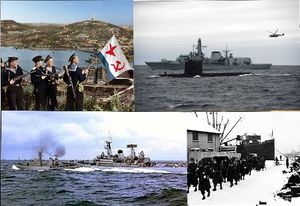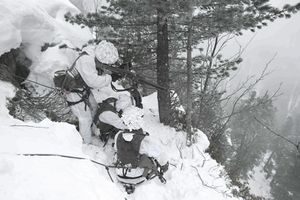Difference between revisions of "Ajaki–Reykani War"
LeotropolisG (talk | contribs) |
|||
| Line 27: | Line 27: | ||
== Prelude == | == Prelude == | ||
| − | In 1956, the governments of [[Reykanes]] and [[Ajakanistan]] made an agreement that both nations would share the oil of Reykanes. In 1958, the new Reykani government introduced a new policy which stopped all oil trade to communist nations, including [[Ajakanistan]]. The law was introduced as the government did not want to support any allies of the old Reykani communist dictatorship. The new policy was denounced by the Ajaki government which condemned Reykanes for violating the agreement. | + | In 1956, the governments of [[Reykanes]] and [[Ajakanistan]] made an agreement that both nations would share the oil of Reykanes. In 1958, the new Reykani government introduced a new policy which stopped all oil trade to communist nations, including [[Ajakanistan]], which caused an oil shortage in Ajakanistan. The law was introduced as the government did not want to support any allies of the old Reykani communist dictatorship. The new policy was denounced by the Ajaki government which condemned Reykanes for violating the agreement. |
== Course of the war == | == Course of the war == | ||
| − | ===Start of the war=== | + | === Start of the war === |
| − | On 21 August 1958, Ajaki Navy entered Reykani waters in the morning. The | + | On 21 August 1958, [[Ajaki Navy]] entered Reykani waters in the morning. The coast guard was alerted, and at 11:43am, the two ship convoys met. The coast guard went in to stop the Ajaki Navy from entering Reykani, however, twenty minutes later, the first shots came from an Ajaki naval vessel. The fighting ensued for two hours until the local coast guard was overwhelmed. The [[Reykani Navy]] was called in. Small local naval fights broke out for couple weeks, as neither side was willing to negotiate to end the fighting. |
| − | === | + | === Blue Line === |
| − | The | + | The so-called "Blue Line" was established by the [[Terraconserva Council of Nations]] (TCN) as a demarcation line in the sea to prevent any further fights in 2 November 1958 between the armies of Reykanes and Ajakanistan. It served as the de facto border until the Ajaki Navy landed in [[Port Sturla]], breaking the Blue line. |
| − | ===International | + | === International intervention === |
| − | |||
| − | + | Following the outbreak of the war in 1958, the [[Government of Tirol|Tiroler government]] issued an ultimatum to the [[Ajaki Armed Forces]] calling for an immediate cession of violence. Failure to meet this demand would result in direct intervention. In addition to this sanctions on all military goods and materials to Ajakanistan were introduced and the contemporary [[Premier of Tirol]], [[Albrec de Tor]] entered talks with [[Creeperopolis]], [[Greater Sacramento]], [[Paleocacher]], [[Quebecshire]], and [[Reia]], on introducing a raft of international sanctions. | |
| − | On 11 February 1959, the [[7 Alpine Brigade (Tirol)|7 Alpine Brigade]] was deployed to [[Hafnir]]. They were then moved toward | + | By 1 January 1959, lacking any formal response from the [[Government of Ajakanistan]], de Tor announced a task-force would be dispatched to Reykanes. Shortly after the Tiroler government released an official statement declaring a Maritime Exclusion Zone covering 400NM (~740km) from the Reykani coastline in all directions. According to the statement, the [[Tiroler Defence Forces]] would actively engage any Ajaki vessels, aircraft or personnel that could pose a threat to the taskforces operation to defend Reykanes. Outside of the exclusion zone, Ajaki vessels or aircraft on a clear approach to the exclusion zone, the statement declared would also be subject to attack via air strike or bombardment from the [[Tiroler Defence Forces]]. Notably excluded from the statement, was usage of language distinguishing between Ajaki military and civilian vessels, leaving the discernment of what could present a military threat to the commanding officers involved in the operation. |
| + | |||
| + | On 11 February 1959, the [[7 Alpine Brigade (Tirol)|7 Alpine Brigade]] was deployed to [[Hafnir]]. They were then moved toward Port Sturla establishing a Tiroler Forward Operations Base in the nearby village of ''Fellabær''. The brigade took up positions in the mountains overlooking Port Sturla, where they engaged Ajaki Forces. | ||
[[File:7Brigada 1960 sniper.jpg|thumb|Tiroler Jägers deployed in Reykanes]] | [[File:7Brigada 1960 sniper.jpg|thumb|Tiroler Jägers deployed in Reykanes]] | ||
Revision as of 17:33, 23 August 2021
| Ajaki–Reykani War | |||||
|---|---|---|---|---|---|
 | |||||
| |||||
| Belligerents | |||||
|
Supported by: |
| ||||
| Units involved | |||||
|
|
| ||||
The Ajaki–Reykani War was a war between Reykanes and Ajakanistan from 1958 to 1960. The war started when Reykanes stopped trading oil with Ajakanistan a year after the Reykani communist government was dissolved.
Contents
Prelude
In 1956, the governments of Reykanes and Ajakanistan made an agreement that both nations would share the oil of Reykanes. In 1958, the new Reykani government introduced a new policy which stopped all oil trade to communist nations, including Ajakanistan, which caused an oil shortage in Ajakanistan. The law was introduced as the government did not want to support any allies of the old Reykani communist dictatorship. The new policy was denounced by the Ajaki government which condemned Reykanes for violating the agreement.
Course of the war
Start of the war
On 21 August 1958, Ajaki Navy entered Reykani waters in the morning. The coast guard was alerted, and at 11:43am, the two ship convoys met. The coast guard went in to stop the Ajaki Navy from entering Reykani, however, twenty minutes later, the first shots came from an Ajaki naval vessel. The fighting ensued for two hours until the local coast guard was overwhelmed. The Reykani Navy was called in. Small local naval fights broke out for couple weeks, as neither side was willing to negotiate to end the fighting.
Blue Line
The so-called "Blue Line" was established by the Terraconserva Council of Nations (TCN) as a demarcation line in the sea to prevent any further fights in 2 November 1958 between the armies of Reykanes and Ajakanistan. It served as the de facto border until the Ajaki Navy landed in Port Sturla, breaking the Blue line.
International intervention
Following the outbreak of the war in 1958, the Tiroler government issued an ultimatum to the Ajaki Armed Forces calling for an immediate cession of violence. Failure to meet this demand would result in direct intervention. In addition to this sanctions on all military goods and materials to Ajakanistan were introduced and the contemporary Premier of Tirol, Albrec de Tor entered talks with Creeperopolis, Greater Sacramento, Paleocacher, Quebecshire, and Reia, on introducing a raft of international sanctions.
By 1 January 1959, lacking any formal response from the Government of Ajakanistan, de Tor announced a task-force would be dispatched to Reykanes. Shortly after the Tiroler government released an official statement declaring a Maritime Exclusion Zone covering 400NM (~740km) from the Reykani coastline in all directions. According to the statement, the Tiroler Defence Forces would actively engage any Ajaki vessels, aircraft or personnel that could pose a threat to the taskforces operation to defend Reykanes. Outside of the exclusion zone, Ajaki vessels or aircraft on a clear approach to the exclusion zone, the statement declared would also be subject to attack via air strike or bombardment from the Tiroler Defence Forces. Notably excluded from the statement, was usage of language distinguishing between Ajaki military and civilian vessels, leaving the discernment of what could present a military threat to the commanding officers involved in the operation.
On 11 February 1959, the 7 Alpine Brigade was deployed to Hafnir. They were then moved toward Port Sturla establishing a Tiroler Forward Operations Base in the nearby village of Fellabær. The brigade took up positions in the mountains overlooking Port Sturla, where they engaged Ajaki Forces.
